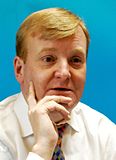United Kingdom general election, 2001
|
|
|||||||||||||||||||||||||||||||||||||||||||||||||||||||||||||||||||
|
|||||||||||||||||||||||||||||||||||||||||||||||||||||||||||||||||||
|
|||||||||||||||||||||||||||||||||||||||||||||||||||||||||||||||||||
|
|
|||||||||||||||||||||||||||||||||||||||||||||||||||||||||||||||||||
| Colours denote the winning party, as shown in the main table of results. | |||||||||||||||||||||||||||||||||||||||||||||||||||||||||||||||||||
|
|||||||||||||||||||||||||||||||||||||||||||||||||||||||||||||||||||
| 1992 election • MPs |
| 1997 election • MPs |
| 2001 election • MPs |
| 2005 election • MPs |
| 2010 election • MPs |
The United Kingdom general election, 2001, was held on Thursday, 7 June 2001, to elect 659 members to the British House of Commons. It was dubbed "the quiet landslide" by the media, as the Labour Party was re-elected with another landslide result and only suffered a net loss of five seats, though with significantly lower turnout than before – 59.4%, compared to 71.3% in the previous election. Tony Blair went on to become the first Labour Prime Minister to serve a second consecutive full term in office.
There was little change outside Northern Ireland, with 620 out of the 641 seats electing candidates from the same party as they did in 1997. Factors contributing to the Labour victory were a strong economy and falling unemployment, as well as that Labour was seen as having delivered on many key election pledges that it had made in 1997. The Conservative Party, under William Hague's leadership, was still deeply divided on the issue of Europe and the party's policy platform was considered to have shifted to a right-wing focus. Hague was also hindered by a series of embarrassing publicity stunts, and resigned as party leader three months later, becoming the first Conservative leader since Austen Chamberlain to leave office without becoming Prime Minister.
...
Wikipedia




